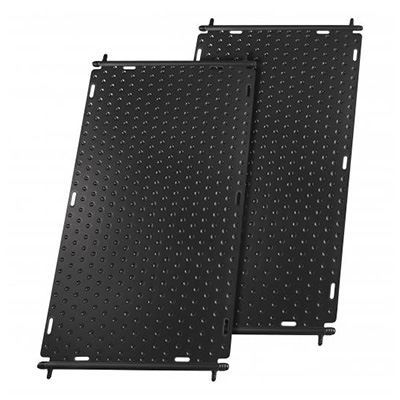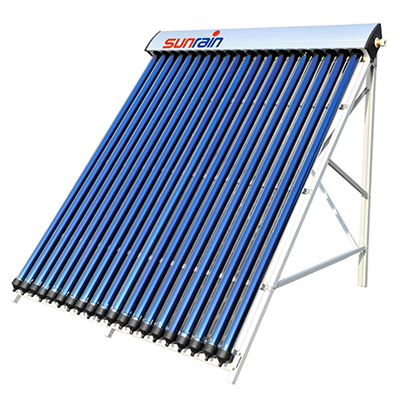Types Solar Pool Heater

Unglazed Solar Pool Collectors

Glazed Solar Collectors

Vacuum Tube Solar Collectors
There are 3 main classifications of solar heaters, all of which can be used to heat a pool however not all are the same. The three types are:
Unglazed Solar Pool Collectors – these are the most popular and basic in design. They typically consist of polypropylene molded plastic that is always black in color. They usually have main header and smaller parallel channels to funnel the water. The heat is transferred by means of conduction from the hot plastic to the cold water. Our Thermax solar panels are classified as unglazed collectors. However, unlike our competitions, our panels are made from HDPE and have no seams or connection tubes. This special construction material and method makes them virtually explosion proof and can handle any type of weather. They can even withstand full freezing with ice water inside. That is why they have a 20 year warranty.
Pros:
Inexpensive
Light weight
Easy to install
Great Performance in warm weather
Virtually indestructible
Cons:
Poor performance in cold weather
Loose performance in windy conditions
Requires extra energy from existing pool pump
Glazed Solar Collectors - These collectors are constructed usually with aluminum and copper piping inside. Like unglazed collectors they use a dark material to absorb and transfer the heat, however the type of material used is important. Our Thermax Extreme uses a special Aluminum/Nitrogen Blue Film absorber that is highly absorptive to the solar radiation. The heat transfer is done through copper tubes which is the best material for conducting heat. The main difference between unglazed and glazed is that the collectors are surround in an insulated cabinet with a special glass window. This allows the collectors to absorb the heat, but the glass acts like a house window and does not allow the heat to be released. They are almost impervious to outside factors such as wind and rain. Their high-tech construction allows them to operate at much lower temperature differences and they perform well moderate cloudy conditions.
Pros:
Higher performance
Work in colder weather and in cloudy conditions
System is separated form the pool system so it is not effected by chemicals in the pool
Most Energy efficient as they use a smaller circulation pump drawing under 40 watts
Cons:
More Expensive up front
More difficult to install
Vacuum Tube Solar Collectors – The vacuum tube represents the ultimate in solar thermal performance. It is by far the most efficient collector and will reach temperatures exceeding 400 F Degrees! The vacuum tube works very similar to a thermos whereby there is almost no heat loss back to the outside. They can work in conditions below -40 F and still produce high temp heat. However vacuum tubes perform best in high heat applications or low temperatures. They can be great for indoor pools in cold climates. But for most outdoor pools the vacuum tube is actually the worst for seasonal pool performance.
Pros:
Highest performance
Work in any temperature including winter and below freezing
Separate for the pool system so not effected by chemicals in the pool
Most Energy efficient as they use a smaller circulation pump drawing under 40 watts
Cons:
Most Expensive
Requires constant heating load
Least effective for seasonal pool heating
Difficult controlling the heat
What are best for pool heating?
This is a question that depends on where the pool is located and at what temperatures the pool is being used. For example, if a pool is located indoors in Minnesota, the vacuum tube would be the best performing for the winter months. However, most pool projects are seasonal and as such they are used when the temperatures start to average 65F and above. Now let’s assume the average target temp of most pools is around 87 F. This means there is only 22 F degree of temperature difference between the air temperature and the target pool temperature. This is known as the delta. As you can see from the graph below, for pools that only have a small delta, then the glazed pool heaters perform best. However, if we factor in wind, lower sunlight (cloudy areas) and colder temperatures or higher pool temperatures, then the better choice would be the glazed pool collector. Only where a high delta is needed would we see any value in the vacuum tubes.









